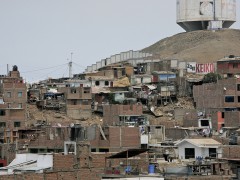Democratic governance and institutional quality: Policy and research challenges for Latin American development

This article was originally drafted by Gonzalo Alcade and Foro Nacional Internacional for the newsletter “Agenda Suramerica” as part of the Rockefeller Foundation’s Searchlight Process. For more Searchlight content on futurechallenges.org, please click here.
At FORO Nacional Internacional’s (FNI) recent forum in Lima on the “Trends and Challenges for Development in Latin America”, there was general consensus that “institutions matter” very significantly for growth and sustainable development, and that they are particularly important for the Latin America’s future. However, many fundamental conceptual questions remain regarding institutions (e.g. how to define institutions, as distinct from organizations or structural factors), methodology and operations (e.g. what determines institutional quality, and how it can be measured), and public policy formulation (e.g. how to foster democratic institutions of good quality).
A slum in Peru. (By Alex Proimos from flickr.com CC BY 2.0)
Evidence suggests that weak institutions are likely to jeopardize growth, even with continued economic resilience in the midst of the global crisis and with favorable external conditions, such as high demand for Latin American commodities. Additionally, these external conditions will eventually change, and predictions vary between five and twenty years left for the current “window of opportunity” for growth. The data and analysis, presented by José Antonio Alonso at the meeting, suggest that institutional quality is the main determinant of long-run growth.[1] Moreover, his study suggests that there are four dimensions of institutional quality: static efficiency; credibility/ legitimacy; security/ predictability; and adaptability/ dynamic efficiency. Latin America may be growing because of its natural resources and fiscal discipline, but this is in spite of a low level of institutional quality, understood in terms of these dimensions. According to Alonso, this is explained by its high level of inequality (it is the most unequal region in the world, although distribution has improved in recent years), as well as by the region’s low level of taxation.
The conclusions suggested broad areas for further research: the need for a broader conception of what an institution is; identifying the criteria that define institutional quality; understanding how socially-controlled variables (education, equity, taxation and the level of development) influence institutional quality; and identifying policies to improve fiscal distribution and social contract between State and citizens. In the face of such institutional weakness and potential consequences, the recent progress in the reduction of poverty and inequality does not warrant excessive optimism. Rather, the region should look more closely at national and sectorial cases in order to understand determinants of institutional quality within each context.
Urban Development in La Paz, Bolivia. (By Benjamin Dumas from flickr.com CC BY-NC-SA 2.0)
The continued importance of institutions for sustainable development poses various questions that researchers and decision makers will need to address with some urgency. Considering the precariousness of democracy throughout much of Latin America, operationalizing “quality” for purposes of implementation and evaluation must be tied to democratic values, from the national to the local level, and from national programs to community projects. It is not yet clear how this should be done.
Even at the meeting, different concepts of “institution” were discussed. For some, “institutions” were principally intangible rules, including informal norms, while others appeared to refer to organizations and explicit legal frameworks. Much dialogue, especially including decision makers, must be fostered regarding the importance and understanding of institutions, and their role in democracy, economic growth and development.
The key characteristics of institutional quality must still be discussed. For international comparative purposes, there is some general consensus but the list of priorities may greatly vary according to different contexts (including cultural factors), and this will only be clarified with further studies of the determinants of institutional quality in particular sectors, organizations, cities and regions. To complement case studies this should include consultations of citizens and democracy experts, development and institutional performance.
Country case studies of democratic institutions and their effects on growth and development, over time, must be fostered and widely discussed, but also similar studies should be promoted in economic sectors, regions, cities and even neighborhoods. Closely tied to this, there should be more discussions and pilot projects regarding policies that can strengthen institutions, making them more effective and democratic.
Finally, there is a very challenging set of issues that should be addressed by studies that explore the relative importance of institutions versus structural factors. In a world of scarcer natural resources and large, emerging economies, are institutional factors perhaps losing importance vis-à-vis geography and natural resources? Moreover, how should democratic institutions be adapted to meet the challenges and opportunities offered by structural conditions? FNI finds these questions important for research further, within the area of democratic governance.
[1] Alonso, José Antonio (2012), “Governance: the role of institutions”, in FORO Nacional Internacional, Future challenges for Latin American development workshop organized by FNI (Lima, June 4-6, 2012)


